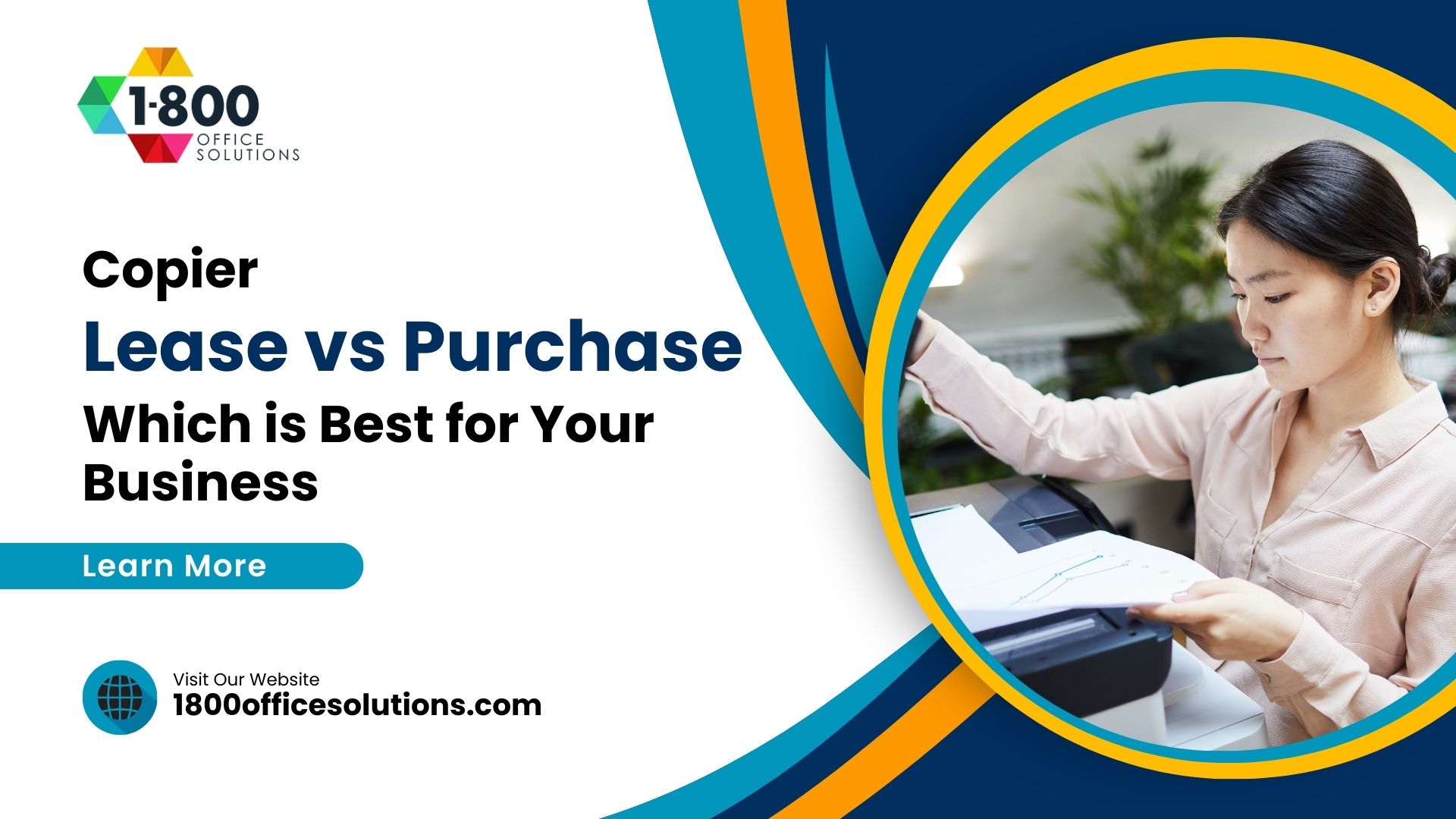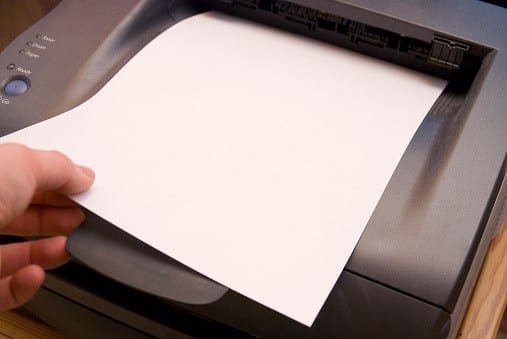The Unexpected Reasons Top Companies are Choosing Copier for Lease Over Buying!
Copier For Lease
In the modern business landscape, the decision between leasing and buying office equipment, especially copier for lease, has become a focal point of discussion. As companies strive for efficiency and cost-effectiveness, the traditional approach of outright purchasing is being re-evaluated. The crux of the debate lies in understanding the financial and operational implications of both options.
Interestingly, there’s an increasing trend towards copier for lease rather than buying them. This shift is not just a fleeting business fad; it’s rooted in tangible benefits that leasing offers over purchasing. Explore various copier and printer options.
In this blog post you’ll learn why top companies are choosing printers and copier for lease over buying.
Why Companies Prefer Printers or Copier for Lease Over Buying
Afford a Better Product
Leasing provides businesses with an opportunity to access high-end copier models that might be out of reach with an outright purchase. This is especially beneficial for startups and SMEs that might not have the capital to invest in top-tier equipment for office. With a copier for lease, companies can:
- Enhance their productivity with advanced features.
- Ensure high-quality outputs without compromising on budget.
- Elevate their professional image with state-of-the-art equipment.
Option to Upgrade to New Technology
The tech world is ever-evolving. What’s considered cutting-edge today might become obsolete in a few years. Leasing a copier for lease or printer offers businesses the flexibility to stay updated with the latest technology. This adaptability ensures:
- Seamless integration with other modern equipment for office.
- Enhanced multifunction capabilities, from scanning to cloud printing.
- Avoidance of the pitfalls of tech obsolescence.
Consistent Monthly Expenses
Budgeting is a cornerstone of successful business management. Leasing offers predictable monthly expenses, allowing companies to:
- Plan their finances with greater accuracy.
- Avoid unexpected maintenance or upgrade costs.
- Allocate funds to other crucial business areas without the worry of copier-related expenses.
Furthermore, with a clear understanding of their monthly obligations towards the leased equipment, companies can strategically allocate their financial resources. This might mean investing in marketing campaigns, expanding the workforce, or delving into research and development. In essence, the financial predictability that leasing provides can empower businesses to make proactive decisions, rather than reactive ones.
In a dynamic business environment where adaptability is key, the ability to anticipate and manage expenses can be a game-changer. Leasing, with its consistent monthly costs, offers businesses the financial clarity they need to navigate the ever-evolving commercial landscape confidently.
Lower Upfront Costs
One of the most compelling reasons to lease or rental a copier is the significant reduction in upfront costs. Instead of a hefty initial investment, companies can:
- Spread out payments over a period, improving cash flow.
- Allocate saved capital to other growth-driven initiatives.
- Enjoy the benefits of high-quality xerox and printers without the financial strain.
By understanding the myriad benefits of buying or leasing, it becomes evident why it’s becoming the preferred choice for many businesses. Whether it’s the allure of top-tier equipment, the promise of consistent technological updates, or the financial flexibility, leasing is redefining how companies approach their equipment for office needs.
Challenges of Purchasing a Copier for Lease
Cash Upfront
One of the primary challenges of buying a copier outright is the immediate financial burden it imposes. While some businesses might have the capital to invest in a new copier, many small and medium-sized businesses struggle with this upfront cost. This immediate financial outlay can:
- Strain the company’s cash reserves.
- Limit the ability to invest in other crucial business areas.
- Result in opting for a lower-end model, compromising on features and print quality.
Furthermore, the pressure to conserve capital might push businesses to settle for a more affordable, but less feature-rich model. This compromise can hinder operational efficiency, as a lower-end copier might not meet the demands of a growing business, leading to slower processing times, frequent breakdowns, or subpar print outputs. In the long run, the decision to save upfront might result in higher maintenance costs and reduced workplace effrot, negating any initial savings.
Outdated Equipment
In our rapidly advancing tech world, copiers and printers can quickly become obsolete. The implications of tech obsolescence are profound. When a business invests in a copy machine, they:
- Risk being stuck with outdated equipment.
- Miss out on newer features and improved efficiency offered by modern models.
- Face challenges in integrating outdated copiers with new office solutions.
Unexpected Costs
Owning a printer or copier means bearing all maintenance and repair expenses. Over time, these costs can accumulate, especially if the multi-function copier is frequently used. Businesses might face:
- High costs for parts and labor.
- Downtime, affecting productivity.
- The need to replace expensive cartridges or parts.
Tax Implications for Both Options
Both leasing and buying have tax implications. Best Copiers for lease are depreciating assets, which can be claimed on taxes. However, many lease documents can also be tax-deductible. Companies should:
- Understand the depreciation benefits of owning a copier.
- Explore the Section 179 deduction for both owned and leased equipment.
- Consult with a tax professional to maximize benefits.
What People Also Ask
Who is the leasing company?
The leasing vendors, often referred to as the lessor, is a specialized entity or financial institution that retains ownership of the equipment or asset. They provide businesses, or lessees, the opportunity to use this equipment in exchange for periodic lease payments. This arrangement allows businesses to access and utilize high-end equipment without the need for a significant upfront investment. The leasing vendors manages the asset, ensuring its maintenance and quality, while the business benefits from its functionality, often with an option to upgrade or change the equipment as technology or their needs evolve.
Is there a buyout option in the lease?
In many copier lease agreements, there’s a provision known as the buyout option. This option grants businesses the choice to purchase the leased equipment at the conclusion of the lease term. The buyout price is typically determined at the onset of the lease and can be a fixed amount, a percentage of the original equipment value, or based on the equipment’s market value at the end of the lease. This option is beneficial for businesses that find the equipment integral to their operations and wish to continue using it without the constraints of a lease.
How long is the lease term?
The duration of a lease term can vary widely based on the agreement between the business and the leasing company. Typically, lease terms for copiers and other office equipment range from 12 to 60 months. The chosen term often depends on the business’s financial situation, the equipment’s expected lifespan, and the company’s future plans regarding technology upgrades. A shorter lease conditions provides more flexibility for equipment upgrades, while a longer term might offer lower monthly payments, making it more budget-friendly for some businesses.
Do we need to insure the equipment?
Yes, it’s customary for businesses to insure leased equipment. When a business enters into a lease agreement, they assume responsibility for the equipment’s care and maintenance. Insuring the equipment protects the business from potential financial liabilities in case of damage, theft, or loss. The leasing company, wanting to safeguard its asset, typically mandates this insurance. It ensures that in unforeseen circumstances, both the lessor and the lessee are not burdened with unexpected costs. The insurance coverage should be comprehensive, covering potential repairs or replacement of the equipment.
Can I add equipment to the lease at a later date?
Certainly, many leasing companies offer flexibility in their agreements, allowing businesses to add equipment to their existing lease. This provision is especially beneficial for growing businesses that might experience increased operational demands. By adding equipment to an existing lease, businesses can ensure that their infrastructure keeps pace with their growth without entering into multiple, separate lease agreements. However, it’s essential to communicate with the leasing company and understand the terms, as adding equipment might lead to adjustments in monthly payments or the lease duration.
Conclusion
Navigating the decision between rental and buying a copier outright is complex. While leasing vs. purchasing office machines like copiers and printers is debated, there’s no one-size-fits-all. Leasing, through a lease agreement with a reputable leasing company, offers businesses the chance to use the latest Canon Imagerunner or Xerox Versalink without the upfront cost. This cost-effective approach ensures companies have the right equipment that meets their business needs, with predictable monthly payments and the flexibility to upgrade as the business grows.
On the flip side, purchasing an office copier for lease or printer provides full ownership, eliminating the constraints of lease terms and conditions. It offers a sense of stability, especially when buying a copier outright. Plus, there’s potential for tax benefits through depreciation and the elimination of recurring lease costs.
For businesses, from small offices to large enterprises, the decision hinges on introspection. Assessing current needs, future growth, and financial projections is crucial. Whether eyeing a new copier for a new office or considering printer and copier leases, understanding the pros and cons of both leasing and buying is essential. This insight ensures businesses make informed decisions, aligning with their goals for long-term success.












